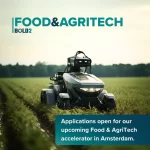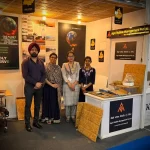For already 50 years, the Vrije Universiteit Brussel has stood for freedom, equality and connectedness. These values are strongly present on our campuses, in our students as well as our staff. At the VUB, you’ll find a diverse collection of personalities: pure innovators and especially people who are 100% their authentic selves. With about 3.500 employees, we are the largest Flemish-speaking employer in Brussels, an international city with which we are all too happy to be connected, and around which our four campuses are located.
Our education and research are grounded in the principles of free research with an eye on human progress. We disapprove of every purely authoritative argument and guarantee the free formation of judgement that is necessary for this basic principle to be incorporated in the community.
The VUB is autonomous and managed democratically. As such, we guarantee fundamental freedoms within our university, as well as the right of the university community to be involved in making and checking university policy.
The mission of the university includes:
- the development, the transfer and the application of high-standing academic education and scientific research, free from any prejudice;
- community integration of this in a spirit of social compassion;
- critical development of everyone in light of the responsibilities borne in the community.
2 – Position description
The Faculteit Wetenschappen en Bio-ingenieurswetenschappen, Vakgroep Bio-ingenieurswetenschappen, is looking for a PhD-student with a doctoral grant.
More concretely your work package, for the preparation of a doctorate, contains:
Within the ‘Research Group of Industrial Microbiology and Food Biotechnology (IMDO)’ you will perform doctoral studies in food biotechnology, and this with contribution to an internally or externally financed research project.
All projects involve microbiological work, making use of culture-dependent and culture-independent advanced techniques, (meta)genomic and/or (meta)transcriptomic work including bioinformatics, and/or (meta)metabolomic work, making uses of various chromatography separations and detection systems including mass spectrometry.
The topics to choose from are the following:
- Cocoa fermentation:
Cocoa fermentation is the first step in the curing process of raw cocoa beans before the fermented and dried cocoa beans can be used for chocolate production. This PhD research project aims at performing starter culture-initiated cocoa fermentation processes, next to spontaneous ones, in cocoa-producing countries, making use of different cocoa varieties and microbial cultures, to enable controlled and steered fermentation processes regarding flavour and health-related compounds.
- Sourdough production:
Sourdough is a mixture of flour and water that is fermented by lactic acid bacteria (LAB) and yeasts, either spontaneously or after addition of a starter culture. To study these fermentation processes, both laboratory fermentations with flour as the sole non-sterile component and fermentations made under bakery conditions are carried out. This PhD research project aims at getting insights into the field-cereal-flour-sourdough-bread axis in general and the aroma and taste formation of liquid and firm, active wheat sourdoughs within a reasonable processing time in particular, through the investigation of the impact of the flour used and the interactions between LAB and/or yeasts by means of the co-cultures applied, to ultimately improve the bread flavour and taste and enhance presumptive health-promoting properties.
- Meat fermentation:
Fermented meats are produced based on the activity of particular species of lactic acid bacteria and coagulase-negative staphylococci, which offer a variety of functionalities. The use of selected strains may, for instance, provide alternatives to the use of (curing) salt(s), which are now added for reasons of colour and food safety but are increasingly under scrutiny because of a potential association with the risk of colorectal cancer. Also, certain bacteria may improve the health profile of fermented meats by generating compounds of nutritional interest. Yet, more information is needed whether bacteria with such features are sufficiently competitive during meat fermentation and whether they are able to express their activities in situ. The finality of this PhD project will be to meet a persistent market demand for process modifications, clean labels, and healthier end-products, through the use of functional starter cultures.
- Lambic beer production:
Lambic beers are traditionally produced in Belgium in the proximity of the Senne river valley through the spontaneous microbial inoculation of wort, which is prepared from barley malt, unmalted wheat, aged dry hops and water, that initiates a long-lasting fermentation and maturation process carried out in wooden barrels. This PhD research project aims to unravel the impact of the raw materials and barrel fermentation and maturation process on the microbiota and flavour development.
For this function, our Brussels Humanities, Sciences & Engineering Campus (Elsene) will serve as your home base.
3 – Profile
What do we expect from you?
You have a university degree of MSc in Bioengineering Sciences (Chemistry and Bioprocess Technology or Cell and Gene Biotechnology) or equivalent.
- You have in-depth knowledge of and great interest in (food) microbiology, biochemistry, bioinformatics, fermentation technology, and/or food science and technology;
- Important additional qualifications are:
- sense of initiative;
- team spirit;
- sense of responsibility;
- motivation and dynamism;
- a hard-working mindset;
- persistence;
- stress resistance;
- good communication and reporting skills.
- Good knowledge of the English language (oral and written) is required.
- You have not performed any works in the execution of a mandate as an assistant, paid from operating resources, over a total (cumulated) period of more than 12 months.
4 – Offer
Are you going to be our new colleague?
You’ll be offered a full-time PhD-scholarship, for 12 months (extendable up to max. 48 months, on condition of the positive evaluation of the PhD activities), with planned starting date 01/02/2022.
You’ll receive a grant linked to one of the scales set by the government.
IMPORTANT: The effective result of the doctorate scholarship is subject to the condition precedent of your enrolment as a doctorate student at the university.
At the VUB, you’re guaranteed an open, involved and diverse workplace where you are offered opportunities to (further) build on your career.
As well as this, you’ll enjoy various benefits:
- Full reimbursement for your home-work commute with public transport according to VUB-policy, or compensation if you come by bike;
- Cost-free hospitalisation insurance;
- The space to form your job content and continuously learn via VUB LRN;
- Excellent facilities for sport and exercise;
- Ecocheques;
- Delicious meals at attractive prices in our campus restaurants;
- An open, family-friendly work environment where attention is paid to work-life balance, and exceptional holiday arrangements with 35 days of leave (based on a fulltime contract).
5 – Interested?
Is this the job you’ve been dreaming of?
Send us ONLINE and at latest on 15/12/2021 your CV, letter of motivation and the highest degree you’ve attained (not applicable for VUB alumni).
Do you have questions about the job content? Contact Luc De Vuyst at luc.de.vuyst@vub.be or on 02/6293245.
Would you like to know what it’s like to work at the VUB? Go to www.vub.ac.be/vacatures and find all there is to know about our campuses, benefits, strategic goals and your future colleagues.





